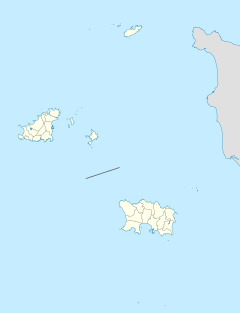Casquets lighthouses

Les Casquets seen from the ferry Condor Liberation
|
|
|
Channel Islands
|
|
| Location | Les Casquets Alderney Channel Islands |
|---|---|
| Coordinates | 49°43′19″N 2°22′37″W / 49.72194°N 2.37694°WCoordinates: 49°43′19″N 2°22′37″W / 49.72194°N 2.37694°W |
| Year first constructed | 1724 |
| Automated | 1990 |
| Construction | stone tower |
| Tower shape | cylindrical tower with balcony and lantern |
| Markings / pattern | white and red horizontal bands, red lanten |
| Height | 23 m (75 ft) |
| Focal height | 37 m (121 ft) |
| Light source | solar power and wind turbine |
| Intensity | 452,000 candela |
| Range | 18 nmi (33 km; 21 mi) |
| Characteristic | Fl (5) W 30 s. |
| Fog signal | 2 blasts every 60s. |
| Admiralty number | A1532 |
| NGA number | 8264 |
| ARLHS number | GUE-002 |
| Managing agent | Trinity House |
Casquets Lighthouse is an active lighthouse located on the rocky Les Casquets, Alderney, Channel Islands.
Casquets Lighthouse is the latest in a series of three lights on Les Casquets. The first lighthouses started operation on 30 October 1724, and were three towers lit by coal fires called St Peter, St Thomas and the Dungeon. Three stone towers were built to give the lights a distinctive appearance which would not be confused with lighthouses in nearby France.
They were built by Thomas Le Cocq, owner of the rocks, under licence from Trinity House and who was paid a halfpenny per ton of ship when vessels passed the rocks and in turn he paid Trinity House 50 pounds per year for the right to run the lighthouses. The lighthouses reverted to Trinity House in 1785.
They were converted to oil lamps with metal reflectors which were first used on 25 November 1790; and upgraded again with apparatus to rotate a beam of light in 1818. This had a clockwork mechanism which was wound up every hour and a half and gave one flash every 15 seconds.
The lighthouses were badly damaged and the lanterns smashed in a severe storm on 31 October 1823. The towers were raised by a further 30 feet (10 m) in 1854, and equipped with 184 kilocandela lamps which gave three slow flashes every half minute. In 1877 the North West Tower was raised again and the lights in the other two towers discontinued.
British commandos of the Small Scale Raiding Force made two raids during the Second World War on the lighthouse, following the German occupation of the Channel Islands in 1940. The first raid, Operation Dryad, took place on 2–3 September 1942 and the seven keepers were taken back to England as prisoners of war.
...
Wikipedia

